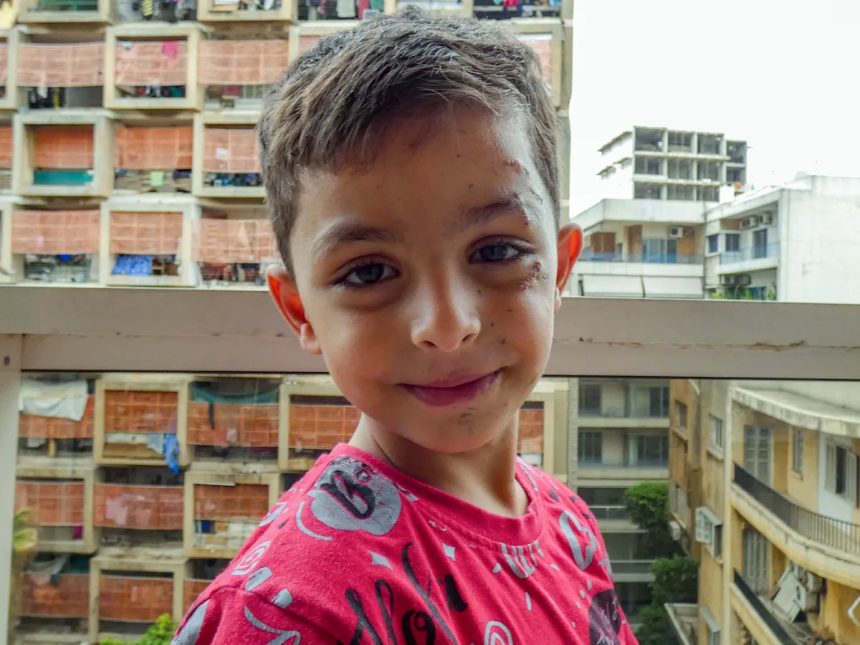Beirut, Lebanon – They wait, smiling mischievously, their eyes bright at the sight of two wrapped Spider-Man notebooks.
Ali, the bolder of the two despite being only three years old, tears his open at once.
Six-year-old Omar fumbles, one-handed, with the plastic, his cheeks reddening with embarrassment. Without hesitation, Ali reaches across, peels it open and sets the notebook back in Omar’s lap.
Soon Omar will have a prosthetic arm like Ali, and the small rituals of childhood, like opening a present, will be possible again.
The boys are not brothers, although they live as if they were.
In Hamra, a bustling district of Beirut where traffic clogs the streets and the Mediterranean glimmers beyond the hotels, they share the same apartment block and the same wounds.
Both were pulled from the rubble. Both were the only survivors of their families, and both had their hands torn off by an Israeli bomb.
Once separated by hundreds of miles, Omar Abu Kuwaik from Gaza, and Ali Khalife from southern Lebanon, are casualties of Israel’s war on children.
They live under the care of their aunts. Maha, who brought Omar out of Gaza, was forced to leave her own teenage children behind.
Omar, left, and Ali have become very close in the time they’ve spent together at the Ghassan Abu Sittah Children’s Fund accommodation, in Beirut, Lebanon [Caolán Magee/Al Jazeera]
And Sobhiye, who never had children of her own, vowed to raise Ali after the rest of her family was killed.
Omar and Ali now call their aunties Mama.
“The memories of before are too painful,” Maha said. “They just want to forget.”
‘Ali asks if his parents can still see him’
The Khalife family home in Sarafand, in southern Lebanon, was a three-storey home that once bustled with children.
“We used to go for ice cream and meals, hang out during the day,” Sobhiye recalled.
“That morning felt calm,” she said, describing waking up and going out early on October 29, 2024. By 8:15am, an Israeli shell struck suddenly. She was driving close enough to feel it.
Rescuers worked through the day, digging through concrete and steel. The truck carrying equipment shuttled back and forth, but no signs of life emerged as darkness fell.
Fourteen hours after the shelling, they found two-year-old Ali under two storeys of debris, his small body withered, his hand severed, his breath shallow but still present.
He lay unconscious for a week, kept alive by oxygen. Sobhiye was washing the bodies of the dead when she learned he had survived.
When he opened his eyes at last, he reached for his parents, but they had been killed, along with 13 other members of his family.

Ali with his older sister Nour, who was five when she was killed by Israel in an airstrike on their home in Sarafand, Lebanon [Courtesy of Sobhiye Khalife]
“He asked me if his parents can still see him,” she recalled. “I told him they watch you all the time. They will always see you, but you can’t see them.”
Ali fidgets with his prosthetic arm. The laughter from the morning’s gifts has gone, replaced by a restlessness that sits in the room. He calls for “Mama” between his aunt’s sentences, tugging at her sleeve, trying to draw her gaze.
When she doesn’t look up, his voice rises into a cry. “He has a strong personality,” his auntie says, half-smiling. “The doctor says that’s what kept him alive.”
That month, Israel’s war with Hezbollah had escalated from cross-border rocket fire into full bombardment by Israel of Lebanon’s south and capital.
By the time a ceasefire was reached, Israel had killed more than 4,000 people and wounded nearly 17,000. This includes at least 240 children killed, with at least 700 more injured. Despite the truce, Israeli fire has continued to cross the border.
Omar was the only survivor
Dr Ghassan Abu Sittah, a Palestinian British surgeon, treated Ali in Lebanon and helped secure his care through the Ghassan Abu Sittah Children’s Fund, the charity he founded.
The fund has cared for nearly 180 children, 19 Palestinians from Gaza, and 158 Lebanese, all scarred by Israel’s bombs. Some lost limbs, others live with burns, brain trauma, or the scars of sniper fire, tank shells and artillery blasts.

Six-year-old Omar Abu Kuwaik from Gaza received incomplete treatment in the United States and now has to be fitted with a prosthetic arm all over again, in Beirut, Lebanon [Caolán Magee/Al Jazeera]
Some are orphans, others have relatives still in Gaza or Lebanon’s south. All are given housing, medical treatment and psychological support, often after surviving the Rafah crossing into Egypt with a family member.
Omar is one of the 19 Palestinian children helped by the fund.
“Ten days after the war started, we were told to evacuate the building,” Maha recalled. “Omar went to his mum’s family’s house in az-Zahra, 15 minutes from where I was staying.”
On the morning of December 6, 2023, the first missile struck. Maha heard it from her home. “You hear these sounds a lot because the bombings are very, very loud,” she said. “But this time was different.”
The Kuwaik home was four floors. “His family were eating breakfast on one side of the house, and Amar was outside riding his bicycle. So when the bomb hit, he flew – that’s when his hand was injured.”
When rescuers reached the rubble, only one child remained alive. “There were 15 people in the building,” Maha said. “Omar was the only survivor.”
Now he sits quietly in the corner. Ali has gone out with his aunt, and Omar watches the space where his friend was. The room feels emptier without his presence. Maha speaks softly, as if her words might wake something fragile.

Omar with his older sister, Yasmin, who was six when she was killed by Israel in an airstrike that killed 14 other members of the family in Gaza [Courtesy of Maha Abu Kuwaik]
She explains how she got him onto a medical evacuation list and they crossed Rafah into an Egyptian hospital, where she was able to apply for him to go to the United States for surgery and a prosthetic.
But his treatment wasn’t completed in the US, and they were returned to Egypt without a proper fitting or physiotherapy. Then, Maha learned about the Ghassan Abu Sittah fund and was able to apply for Omar’s treatment to be completed, as he needed a whole new prosthetic and the therapy to allow him to use it.
She had left her three teenage children behind in Gaza to keep him alive.
At the mention of the doctor’s name, Omar’s face lights up. It is because of Dr Abu Sittah, Omar will soon have his new arm.
The ‘genocidal machine’s’ attacks on healthcare
Abu-Sittah has spent most of his life moving in and out of Palestine.
He first entered Gaza in 1989 as a young medical student during the first Intifada. He returned during the second Intifada, then again in 2008–2009, 2012, 2014, and during the Great March of Return in 2018.
When Israel’s assault on Gaza began in October 2023, Abu-Sittah crossed the border once more.

Seven-year-old Aya Abdel Karim Sumad is another child amputee from Gaza. Her leg was torn off by an Israeli tank shell that hit her bedroom, where she was hiding with her baby sister under a blanket. In Beirut, Lebanon [Caolán Magee/Al Jazeera]
At al-Shifa Hospital with Doctors Without Borders (MSF), and later at al-Ahli, he operated for 45 days straight, stitching together children, women and men torn apart by Israeli artillery and air strikes – all while under bombardment himself.
Barred now by Israel from re-entering Gaza, he travelled to The Hague, where he gave evidence to the International Criminal Court. Investigators later found a plausible case for genocide against Israeli Prime Minister Benjamin Netanyahu and his defence minister, Yoav Gallant.
In December 2023, he established the fund in Beirut to care for Palestinian and Lebanese children. Working with NGOs and doctors on the ground, the fund identifies the worst cases, brings children to Beirut for surgery at the American University of Beirut Medical Center, and houses them with their family members in apartments while they recover. Families are offered a year’s accommodation, along with social welfare and psychological care, before returning home.
“When children are wounded in war, it is not just their bodies,” Abu Sittah said. “They are emotionally wounded, socially wounded, existentially wounded. Their whole view of the world is altered. They will need care for the rest of their lives.”
In Lebanon, he explained, the most common injury is traumatic brain injury. In Gaza, it’s amputations. “Children who might have kept their limbs with proper surgery are instead left without them.”
Of Gaza’s five cardiologists, only two remain, says Abu Sittah. The kidney specialists are gone, and every board-certified emergency doctor has been killed.
Of all the healthcare facilities in the enclave, 94 percent have been damaged or destroyed by Israel. The World Health Organization (WHO) has documented at least 735 attacks on health infrastructure between October 2023 and June 2025.
“It’s part of making Gaza uninhabitable,” Abu Sittah said. “It makes the genocidal machine more resilient.”
The fund now hopes to evacuate 30 more Palestinian children from Gaza with the help of the WHO.
“We know who the children are,” he says. “We are getting them passports … They had no documentation, as some have lived their whole lives under bombardment.”
But Israel blocks their passage, he added, leaving 30 wounded children in need of life-saving care. In total, 15,600 patients, including 3,800 children, are waiting for medical evacuation from Gaza to receive lifesaving care outside of Gaza, according to the WHO.
“Children are absolutely being targeted,” Abu Sittah said. “Everything is a target: children, buildings, healthcare, journalists. Everything.”
Waking up screaming
Ali returns to the room, small and busy, unbothered by the adults talking. The boys catch each other’s eyes and smile, as if sharing a secret joke only they understand.

Three-year-old Ali Khalife from southern Lebanon. In Beirut, Lebanon has had his prosthetic arm fitted and is learning to use it [Caolán Magee/Al Jazeera]
Omar’s aunt Maha recalls the nights when he could not sleep. “He would sleep two hours, then wake up screaming. He was scared to sleep. He thought he would never wake up.”
She would try to show him photographs of his parents, but he turned away. Ali still calls out for his parents, adds Sobhiye.
The women, carrying the weight of both grief and guardianship, admit they struggle to find the words to keep the children steady.
Maha’s husband and three teenage children remain in Rafah, displaced in a camp by the sea. With Israel striking areas it claims are “safe zones”, Maha knows she may never see them again.
The boys, bored now by adult sorrow, return to their notebooks. Ali traces over the Spider-Man figure in his notepad.
Omar is beginning to sleep better now in Beirut, Maha says, but he still dreams of a past that no longer exists.
In his new notepad, Omar sketches the Gaza of his memory: olive trees, butterflies and the birds that once rested in his garden.
“He hopes to go back one day,” Maha says. “To his nursery, his friends – as if nothing ever happened.
“As if the war had not taken everything.”









